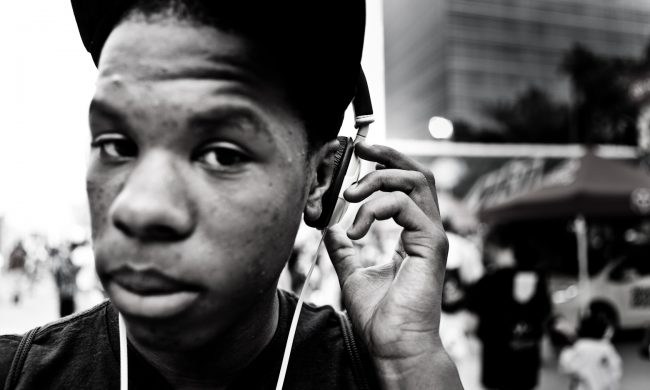
Source: Peter Reid, Flickr.
Many podcasts offer accessible and engaging people’s history lessons. Here are a few that we listen to that may be of interest to high school students. (Some of the podcasts would be appropriate for upper elementary and middle school as well, such as selected Storycorps and Uncivil episodes. Listen first.) Let us know if you share these with your students and/or have others to add.
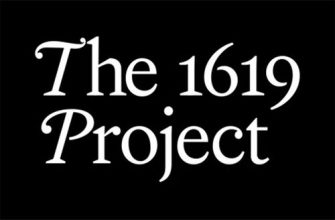 |
1619 ProjectThe 1619 podcast is a companion to the New York Times #1619Project. We recommend the segments on The Economy That Slavery Built, The Land of Our Fathers, and (particularly relevant in this pandemic) How the Bad Blood Started about the impact of racism on healthcare for Africans Americans. |
 |
Broken GroundBroken Ground is a podcast by the Southern Environmental Law Center that explores environmental stories in the South and hears from the people bringing these stories to light. Now in its fifth season, Broken Ground uncovers the story of how a Black community in southwest Memphis and its allies beat the odds and defeated a crude oil pipeline. |
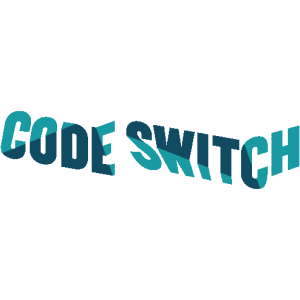 |
Code SwitchCode Switch explores overlapping themes of race, ethnicity, and culture. Timely episodes include: When Xenophobia Spreads Like a Virus, ‘Your Body Being Used’: Where Prisoners Who Can’t Vote Fill Voting Districts, and The Story Of Mine Mill. |
|
|
Democracy NowDemocracy Now! offers the best daily source of independent news on TV, radio, and in a podcast. Each day, the headlines are followed by several in-depth reports, many of which make ideal classroom viewing. With the elections, they expose voter suppression. Stories on the coronavirus pandemic include interviews with people in prison and refugee camps. Their extensive coverage of the climate crisis includes interviews with scientists and activists around the world. Ideal for people’s history teachers and students. |
 |
The Edge of SportsThe Edge of Sports is a sports and culture podcast hosted by Nation magazine sports editor Dave Zirin. His guests are the “trailblazers and earth-shakers at the intersection of sports and politics.” New episodes come out weekly. |
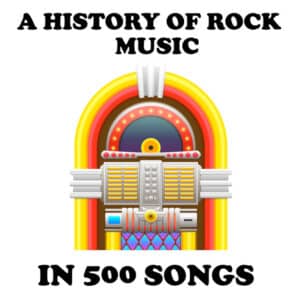 |
A History of Rock Music in 500 SongsIn the podcast A History of Rock Music in 500 Songs, host Andrew Hickey presents a history of rock music from 1938 to 1999, looking at five hundred songs that shaped the genre. Each episode delves into a particular song, noting its historical time, place, and significance. |
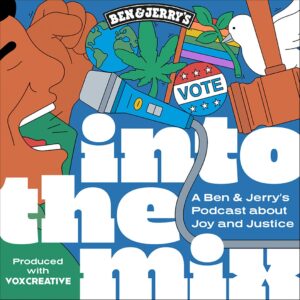 |
Into the MixA Ben & Jerry’s podcast produced with Vox Creative, Into the Mix is a podcast about joy and justice. Hosted by Ashley C. Ford, this podcast brings you “stories of struggle and success from the everyday people at the heart of our greatest fights — from voting rights, to cannabis justice, to dignity for migrant workers — today.” |
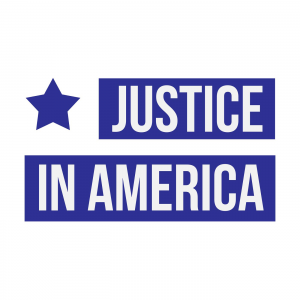 |
Justice in AmericaEach episode of Justice in America addresses a criminal justice issue (such as Juvenile Justice) and features conversations with experts and advocates. This helps fill the silence around mass incarceration in textbooks and the media, especially at times like these when prisoners are among those most vulnerable to epidemics. |
 |
Louder Than A RiotHosted by NPR Music’s Rodney Carmichael and Sidney Madden, Louder Than A Riot reveals the interconnected rise of hip-hop and mass incarceration. From Bobby Shmurda to Nipsey Hussle, each episode explores an artist’s story to examine a different aspect of the criminal justice system that disproportionately impacts Black America. |
 |
RevealReveal offers in-depth stories based on investigative reporting. Recent episodes on the coronavirus, the environment, incarceration, and housing include Containing the coronavirus, Scuttling science, The lost homes of Detroit, Farm wars, and Development arrested. High school teacher Lindsey DiTomasso has used the episode, Amazon Behind the Smiles, with The Homestead Strike lesson. |
 |
Scene on Radio: The Land That Never Has Been YetThe Land That Never Has Been Yet, the latest in the Scene on Radio podcast series, calls into question the United States’ claim to democracy. The first four episodes explore our country’s founding period — and those too-often glorified events and documents, like the Revolution and the Constitution — showing their fundamentally antidemocratic nature. They could be paired with the Constitution Role Play and the #1619Project. |
 |
School ColorsSchool Colors is a narrative podcast that focuses on the story of Ocean Hill-Brownsville in Brooklyn where “Black and Puerto Rican parents tried to exercise power over their schools and they collided headfirst with the teachers’ union — leading to the longest teachers’ strike in U.S. history.” It will be of interest to students studying the history of New York, labor organizing, and/or schooling. |
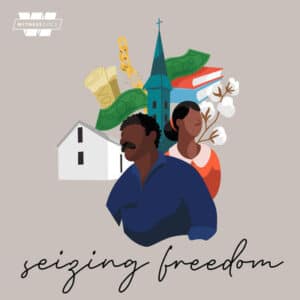 |
Seizing FreedomThe story of the end of the Civil War you’ve probably been taught is that the slaves were freed by Northern white men (and maybe a handful of famous Underground Railroad conductors). What’s missing? The story of how Black Americans risked their lives to fight for their own visions of what freedom could be — struggling for their dignity in the face of horrific violence. Seizing Freedom tells the stories of these unsung American heroes. Seizing Freedom is hosted by Dr. Kidada Williams, a historian, author, and professor of U.S. History, with a focus on African Americans. |
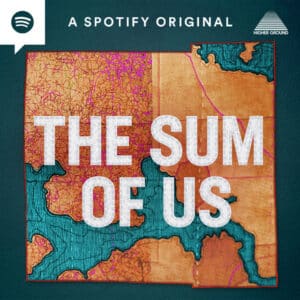 |
The Sum of UsOn the heels of her bestselling book The Sum of Us: What Racism Costs Everyone and How We Can Prosper Together, Heather McGhee embarks on a road trip across the U.S. during the Covid-era, unearthing stories of solidarity and hope in a time of great division and peril for our democracy. Join Heather for The Sum of Us podcast as she travels from rural Maine to the California coast and everywhere in between, meeting extraordinary people who are crossing demographic, cultural, and political lines to build a better future for all of us. |
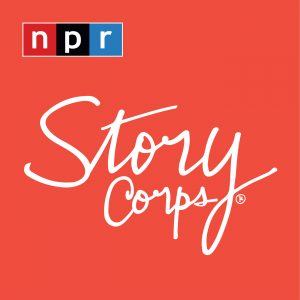 |
StoryCorpsMany StoryCorps interviews highlight people’s memories of movements and events in U.S. history, like the Stonewall Riot, voter suppression, Japanese American internment, racial profiling, immigration, and more. A good way to interest young people in the audio podcasts would be to begin with some of the beautifully designed animations. |
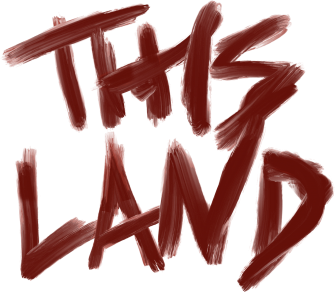 |
This LandIn This Land, hosted by Rebecca Nagle, an Oklahoma journalist and citizen of the Cherokee Nation, this podcast provides an in-depth look at how a cut and dry murder case opened an investigation into half the land in Oklahoma and the treaty rights of five tribes. Follow along to find out what’s at stake, the Trump administration’s involvement, the larger right-wing attack on tribal sovereignty and how one unique case could result in the largest restoration of tribal land in U.S. history. Selected segments can be used with The Cherokee/Seminole Removal Role Play. |
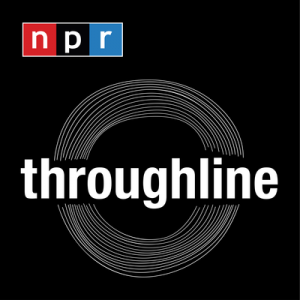 |
ThroughlineIn NPR’s Throughline podcast, “the past is never the past.” This weekly series explores the history of stories in the headlines today. Recent episodes cover the history of vaccinations in the United States, the litter myth, the history of the police, the biography and legacy of Qassem Soleimani, LGBTQ activism before Stonewall, Andrew Johnson’s impeachment, and more. |
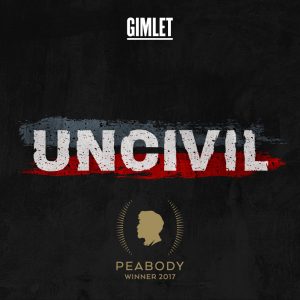 |
UncivilBy profiling everyday people whose current circumstances are inextricably tied to the Civil War and its memory, Uncivil makes the past present. In the first episode, “The Raid,” we meet Fallon Greene, a descendant of Pa Shed, who escaped slavery, joined the Union Army, led a daring and successful raid with Harriet Tubman, and eventually bought the very land on which Fallon’s church sits today. The episodes are miraculous in their brevity (usually about 25 minutes), given the largeness of the history they reveal — perfect for young listeners. |
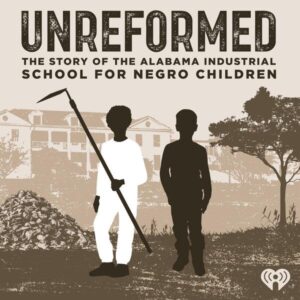 |
UnreformedProduced by iHeartPodcasts and School of Humans Announce Unreformed: The Story of the Alabama Industrial School for Negro Children is an 8-part investigative series hosted by journalist Josie Duffy Rice. This investigative podcast chronicles the history of Mt. Meigs, an institution that began as a safe haven for Black youth before mutating into a “modern-day slave plantation” rife with torture and abuse. It tells the story of the man who decided to blow the whistle on the corruption and brutality that flourished at Mt. Meigs, and the repercussions he suffered as a result. And it traces the histories of the now-adults who were trapped there as children in the 1960s. |
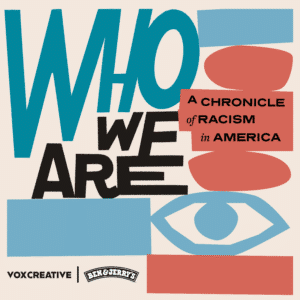 |
Who We AreProduced by Ben & Jerry’s and Vox Creative, Who We Are: A Chronicle of Racism in America is a podcast hosted by journalist Carvell Wallace and ACLU deputy director Jeffery Robinson that examines the white supremacist foundation on which the nation’s legal, political, and social systems were built. There are six episodes of this podcast, as well as an invaluable collection of resources that corresponds to each episode. |
More
|
Selected Episodes from Additional PodcastsThe Occupation That Saved a Wyandot Cemetery (A People’s History of Kansas City) How Wyandot nation member Lyda Conley and her sisters fought to protect their tribal cemetery by occupying it and taking their case to the U.S. Supreme Court. Going to Jail for Justice (Moyers & Company) Tim DeChristopher spoke with Bill Moyers about the necessity of civil disobedience in the fight for justice, how his jury was ordered to place the strict letter of the law over moral conscience, and the future of the environmental movement. The Tuskegee Study Was Just One Example (The American Project) Harriet Washington, author of the book Medical Apartheid, explains, the Tuskegee syphilis study was just one example in “a sea of abusive and, frankly, racist experimentation.” The Out Crowd (This American Life) In reports from the frontlines of the Trump administration’s “Remain in Mexico” asylum policy, listeners hear from asylum seekers in a makeshift refugee camp in Mexico and from the officers who sent them there to wait in the first place. |

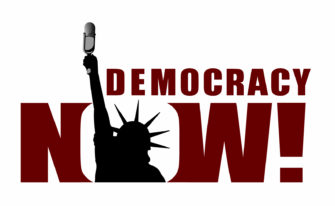
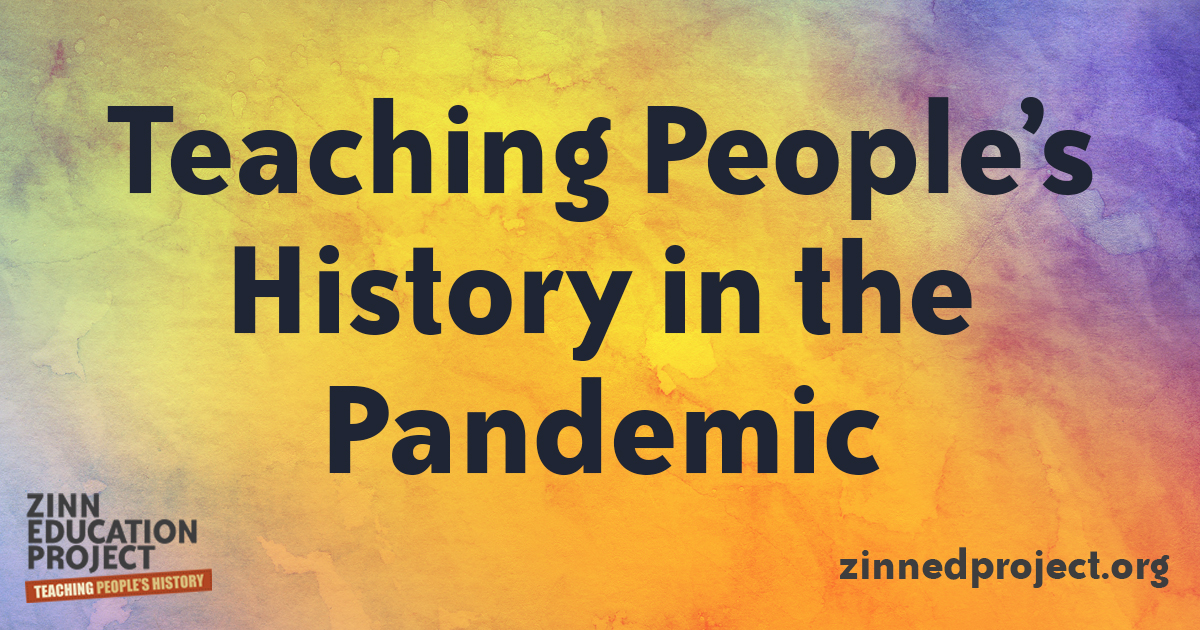





Twitter
Google plus
LinkedIn